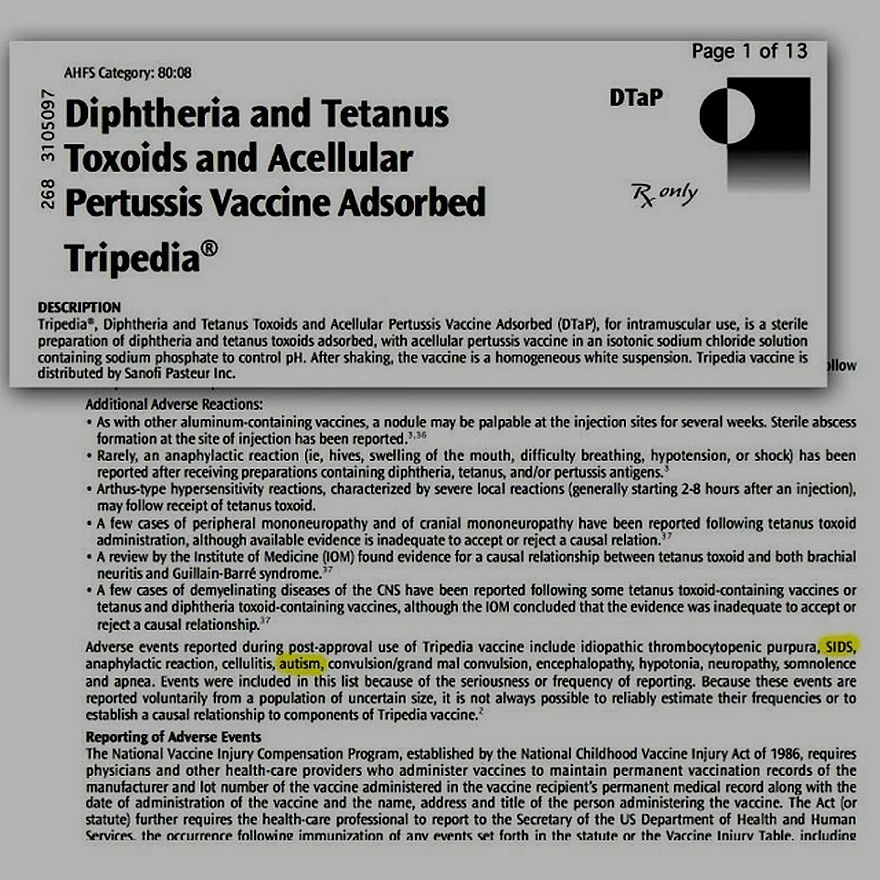By Gaia Santoro Lecchini
Since 2012, the above image has spread around the Internet. It appears to be a list of side effects for a vaccine that mentions among possible reactions “autism.” It originated in two places. First, it can be traced to an anti-vaccine site called Great Mothers Questioning Vaccines, a site that also included an article with the title, “Garlic Proven 100 Times More Effective than Antibiotics” –– a story for another time. Second, it appeared on a Romanian website called Bucovina Profunda, a site dedicated to upholding the traditional values of the Romanian Orthodox Church, while also taking PayPal donations.
In 2016 the picture surged through anti-vaccination sites. It came to the attention of the fact-checking site Snopes, which determined that it was “False.” The highlighted portion is supposed to prove that autism and SIDS are “side effects” of vaccines, specifically the vaccine for “Tripedia, Diphtheria and Tetanus Toxoids and Acellular Pertussis Vaccine Adsorbed” (DTaP). Yet, as the Snopes article points out, the anti-vaxxers managed to not include “crucial context.” Underneath the highlighted text, a disclaimer states that these events are “reported voluntarily” and do not “establish a causal relationship to components of Tripedia vaccine.” In other words, there is no medical or scientific evidence that these “voluntary” reports are connected to the vaccine. It’s fake news.
The current debate over truth, specifically if there is any in today’s polarized world, is marked by populism –– the public emphasizing the political voice of “the people” over that of “the elites.” Fear of fake news and the control behind it stands as part of the movement’s foundation. This isn’t a new worry –– concerns about fake news hold deep roots in American democracy.
Sophia Rosenfeld’s “Democracy and Truth”, narrates the path of democracy’s attempt at equally representing the ideas of the educated elites and the experienced masses. Distrust in elites has been consistent. The “common sense” of the crowd has conspired for centuries that there are “no legitimate trustworthy sources of disinterested information, only […] lies and biased claims to advance hidden causes.” Experts have fallen prey to this theory, their objectivity questioned. Perhaps this is an indication as to why conspiracy has proven popular among our culture: people can “locate themselves on the side of the savvy.”
The story of the anti-vaccination movement is lengthy and has populism written all over it. From the eighteenth century to the present, skepticism toward vaccinations has been as consistent as it is dangerous. Many fronts assaulted vaccination. One of them was religion-based: Clergymen claimed vaccinations not only impeded the work and plans of God but challenged his very omnipotence. Parents were another, their concern based on the process of inoculation. In fact, the Raggedy Ann doll was created by a father who believed the paralyzation and death of his child were due to vaccine administration. It was later recorded that she died from a heart defect. Another, perhaps more influential, front was the backlash to government control, fueled by distrust in its agenda. As vaccinations continued to prove themselves reliable, governments shifted from the promotion of vaccines to the enforcement of mandatory vaccinations. Large parts of the public fought to oppose this, demanding their autonomy from the government.
We continue to see this frustration translated into modern-day opposition; parents and government control especially. School vaccination requirements spread throughout the United States and the same call for autonomy rang. A subset of this anger has been shifted towards the pharmaceutical industry. A distrust of “experts” and what their true “scheme” is, can be seen within the argument that these industries are “profit-obsessed,” and that vaccinations aren’t as important as they claim. Although counterintuitive, an aid to this claim lies in the fact of vaccine success. People are less worried about the risks of diseases because there are generations living who haven’t experienced them.
Yet the biggest, and entirely incorrect, modern-day fear that has arisen against vaccines is the idea that they cause autism. Vast amounts of evidence contracts this. The Centers for Disease Control and Prevention (CDC) has conducted nine studies since 2003 that prove there are no links between vaccines and autism. But there are people who do not believe the evidence. The skepticism defeats it; experts and their studies are simply hiding the truth from the public, all for profit. Thus, Americans are increasingly delaying or foregoing vaccinations for their children.
Recent reports note that the United States might lose its “Measle Free” status given to it by the World Health Organization in 2000. This achievement was an incredible triumph for public health in the United States. Measles had been “a leading killer of children globally.” Before the vaccine was introduced in the U.S., Americans suffered four million cases a year. The CDC reports that from January 1st to October 1st, 2019, however, “a total of 1,249 measles cases and 22 measles outbreaks were reported in the United States. [Representing] the most U.S. cases reported in a single year since 1992…”
The anti-vaccination movement continues to hold many supporters, not only in the United States but in the world. The belief in one’s own knowledge over that of an expert’s is a main contributor to it. These populist notions are intensified by fake news. Stories, like this picture, spread among the worrying public and act like kindling. These numbers that the CDC reports highlight the consequences of this distrust –– they are a clear indication of cause and effect.
